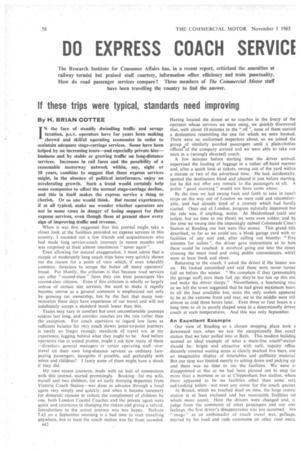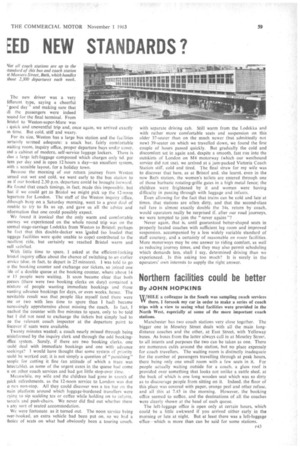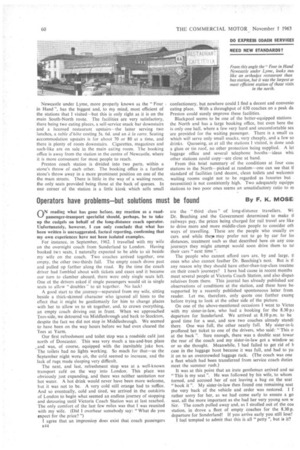DO EXPRESS COACH SERVICE EED NEW STANDARDS?
Page 60

Page 61

Page 62

If you've noticed an error in this article please click here to report it so we can fix it.
If these trips were typical, standards need improving
By H. BRIAN COTTEE IN the face of steadily dwindling traffic and savage taxation, p.s.v. operators have for years been making shrewd and skilful operating economies in order to maintain adequate stage-carriage services. Some have been helped by an increasing tours—and especially private hire— business and by stable or growing traffic on long-distance services. Increases in rail fares and the possibility of a reasonable motorway network within, say, eight or 10 years, combine to suggest that these express services might, in the absence of political interference, enjoy an accelerating growth. Such a trend would certainly help some companies to offset the normal stage-carriage decline, and this in itself makes the express service a thing to cherish. Or so one would think. But recent experiences, if at all typical, make me wonder whether operators are not in some cases in danger of losing support for their express services, even though these at present show every sign of improving traffic and revenue.
When it was first suggested that this journal might take a closer look at the facilities provided on express services in this country. I sounded out a few friends and acquaintances who had made long service-coach journeys in recent months and was surprised at their almost unanimous "never again ".
Even allowing for natural exaggeration, I must admit that a couple of moderately long coach trips have very quickly shown me the reason for a point of view which, if even tolerably common, threatens to scrape the butter off many operators' bread. Put bluntly, the criticism is that because road services can offer " second-class " fares they can treat passengers like second-class citizens. Even if this criticism is wholly or largely untrue of certain star services, the need to make it rapidly become untrue as a general comment is emphasized not only by growing car ownership, but by the fact that many nonmotorists these days have experience of car travel and will not indefinitely accept a standard much lower than this.
Trains may vary in comfort but even uncomfortable journeys seldom last long, and corridor coaches are the rule rather than the exception. For coach operators to regard low fares as sufficient balance for very much slower point-to-point journeys is -surely no longer enough; standards of travel are, in my experience, lagging behind what they ought to be. And before operators rise in united protest, might I ask how many of them —directors, general managers or senior operating staff—ever travel on their own long-distance services as ordinary farepaying passengers, incognito if possible, and preferably with wives and children? I fancy some of them might have a shock if they did.
My own recent journeys, made with DO hint of connections with this journal, started promisingly. Booking—for my wife, myself and two children, for an early morning departure from Victoria Coach Station—was done in advance through a local agent very simply and quickly, and when it became necessary for domestic reasons to reduce the complement of children by one, both London Coastal Coaches and the private agent were quick and courteous in changing the tickets and giving a refund. Introduction to the actual journey was less happy. Perhaps 7.45 on a September morning is a bad time to start travelling anywhere, but at least the coach station was far from crowded.
R42
Having located the dozen or so coaches in the livery of the operator whose services we were using, we quickly discovered that, with about 10 minutes to the "off ", none of them carried a destination resembling the one for which we were booked. There were no uniformed inspectors about, so we joined the group eof similarly puzzled passengers until a plain-clothes official of the company arrived and we were able to take our seats in a (wrongly directed) coach.
A few minutes before starting time the driver arrived, supervised the loading of luggage in a rather off-hand manner and, after a quick look at tickets, swung out of the yard within a minute or two of the advertised time. He had, incidentally, spotted the destination blind and altered it just before starting, but he did not offer any remark to the passengers at all. A polite "good morning" would not have come amiss.
By the time we had swung back and forth to take in coach stops on the way out of London we were cold and uncomfortable, and had already tired of a journey which had hardly started. Once out of London, progress naturally improved but the ride was, if anything, worse. At Maidenhead (cafe and toilets, but no time to use them) we were even colder, and by the time we swung into the imposingly named Colonnade Coach Station at Reading our feet were like stones. This grand. title described, so far as we could see, a bleak garage yard with na facilities of any sort and, after calling out bluntly: " Five minutes for toilets ", the driver gave instructions as to how these could be reached: it Involved going out into the street; crossing the main road And using public conveniences, which were at least fresh and clean.
Returning to the coach, I asked the driver if the heater waE on. He looked astonished and said these were never turned full on before the winter. "We complain if they (presumably the garage staff) turn them full up; they're too hot up this end and make the driver sleepy." Nevertheless, a heartening row as we left the town suggested that he had given maximum boos; to all the heat available but, since the only outlets appeared to be at the extreme front and rear, we in the middle were still almost as cold three hours later. Even three or four hours is a long time to sit in poorly shaped seats in a determinedly driven coach at such temperatures.. And this was only September.
An Excellent Example Our view of Reading as a chosen stopping place took a downward turn when we saw the exceptionally fine coach station that we later pulled into at Bath. This modern building seemed an ideal example of what a main-line coach‘station should be: bright and attractive with cafe, inquiry office. decently covered waiting areas at clearly marked bus bays, and an imaginative display of timetables and publicity material. But our stop was limited merely to setting down and picking up. and there was no time to use the facilities. We were a5 disappointed at this as we had been pleased not to stop fot more than a moment or so at Chippertham bus station, where there appeared to be no facilities other than some very sad-looking toilets—not even any cover for the coach queues At Bristol, which we reached dead on time, the large central station is at least enclosed and has reasonable facilities (ol which more anon). Here the drivers were changed and, tc judge from the comments of other passengers and our own feelings, the first driver's disappearance was not mourned. His " image" as an ambassador of coach travel was, peflaps, marred by his loud and rude comments on other road users.
The new driver was a very lifferent type, saying a cheerful 'good day" and making sure that LII the passengers were indeed )ound for the final terminal. From Iristol to Weston-super-Mare was quick and uneventful trip and, once again, we arrived exactly
m time. But cold, stiff and weary.
For its size, Weston has a large bus station and the facilities :ertainly seemed adequate: a snack bar, fairly comfortable ataitine room, inquiry office, proper departure bays under cover, tnd a cabinet of modern, self-service luggage lockers. There is ilso a large left-luggage compound which charges only 6d. per tern per day and is open 12 hours a day—an excellent system, Nith a sensible layout, for a holiday town.
Because the morning of our return journey from Weston urned out wet and cold, we went early to the bus station to ee if our booked 2.30 p.m. departure could be brought forward. Ne found that coach timings, in fact, made this impossible, but hat if we could get .to Bristol we might pick up the 12-noon leparture for London. The staff of the Weston inquiry office, &hough busy on a Saturday morning, went to a great deal of rouble to try to fix us up, and gave us all the advice and nformation that one could possibly expect.
We found it ironical that the only warm and comfortable ourney we experienced on the whole round trip was on the tormal stage-carriage Lodekka from Weston to Bristol; perhaps he fact that this double-decker was 140ded (so loaded that uggage facilities were quite unable to cope) contributed to the :xcellent ride, but certainly we reached Bristol warm and 'ell satisfied.
With little time to spare, 1 asked at the efficient-looking Iristol inquiry office about the chance of switching to an earlier ervice (due. in fact, to depart in 25 minutes). I was told to go
o the booking counter and exchange our tickets, so joined one ide of a double queue at the booking counter, where about 14 )r. 15 people were waiting. It soon became clear that both meues (there were two booking clerks on duty) contained a fixture of people wanting immediate bookings and those vantine advance bookings for days, or even weeks, hence. The nevitable result was that people like myself (and there were me or two with less time to spare than I had) became ncreasingly apprehensive about missing the coach. In fact, I cached the counter with five minutes to spare, only to be told hat I did not need to exchange the tickets but simply had to ee the relevant coach inspector at the departure point to liscover if seats were available.
Twenty minutes wasted; a coach nearly missed through being nisinformed by the inquiry clerk and through the odd booking)ffice system. Surely, if there are two booking clerks, one tould deal with immediate bookings and one with advance :ookings? I would have thought that some system of pr.ority :ould he worked out; it is not simply a question of "punishing" )eople for cutting it fine (an attitude of which a trace was letectable), as some of the urgent cases in the queue had come
n on other coach services and had got little stop-over time. Meanwhile, my wife and the children had gone in search of mick refreshments. as the 12-.noon service to London was due
o run non-stop. All they could discover was a tea bar on the nain platform around which luggage-burdened travellers were rying to sip scalding tea or coffee while holding on to infants, )arcels and push-chairs. We never did find out whether there s any sort of seated accommodation.
We were fortunate as it turned out. The noon service being )ver-hooked, an extra vehicle had been put on, so we had a :hoice of seats on what had obviously been a touring coach, with separate driving cab. Still warm from the Lodekka and with rather more comfortable seats and suspension on this older 37-seater than on the much newer (but admittedly not new) 39-seater on which we travelled down, we found the first couple of hours passed quickly. But gradually the cold and discomfort set in again and, despite a smooth, fast run into the outskirts of London on M4 motorway (which our westbound service did not use). we arrived at a jam-packed Victoria Coach Station stiff, cold and tired. The final straw for my wife was to discover that here, as at Bristol and. she learnt, even in the new Bath station, the women's toilets are entered through one of those barbaric rotating-grille gates in a high metal fence; the children were frightened by it and women were having difficulty in passing through with luggage and infants.
Even allowing for the fact that trains can be cold and late. at times, that stations are often dirty, and that the second-class rail fare is almost exactly double the 34s. return by coach, would operators really be surprised if. after our road journeys, we were tempted to join the "never agains"?
Never again, that is, until guaranteed better-shaped seats in properly heated coaches with sufficient leg room and improved suspension, accompanied by a less widely variable standard of staff courtesy, and a certainty of reasonable en route facilities. More motorways may be one answer to riding comfort. as well as reducing journey times, and they may also permit scheduling which demands less, shall I say, determined driving than we experienced. As this asking too much? It is surely in the operators' own interests to supply the right answer.
Northern facilities could be better
By JOHN HOPKINS WHILE a colleague in the South was sampling coach services VI' there, I forsook my car in order to make a series of coach trips with a view to seeing what facilities were provided in the North West, especially at some of the more important coach stations.
Manchester has two coach stations very close together. The bigger one in Moseley Street deals with all the main longdistance coaches and the other, at East Street, with Yelloway buses. As buses from the latter always call in at Moseley Street, to all intents and purposes the two can be taken as one. There are numerous cafes around the station, but no place expressly for coach travellers. The waiting room is distinctly inadequate for the number of passengers travelling through at peak hours, there being only one small room with a few seats in it. For people actually waiting outside for a coach, a glass roof is provided over something that looks not unlike a cattle shed. at the back of which is one long wooden seat which was so dirty as to discourage people from sitting on it. Indeed, the floor of this place was covered with paper, orange peel and other refuse, and all this at 7.45 in the morning. However, the booking office seemed to suffice, and the destinations of all the coaches were clearly shown at the head of each queue.
The left-luggage office is open only at certain hours, which could be a little awkward if you arrived either early in the morning or late at night. But at least there was a left-luggage office—which is more than can be said for some stations.
Newcastle under Lyme, more properly known as the "Four in Hand ", has the biggest and, to my mind, most efficient of the stations that 1 visited—but this is only right as it is on the main South-North route. The facilities are very satisfactory, there being two eating places, a self-service snack bar downstairs and a licensed restaurant upstairs--the latter serving two lunches, a table d'hôte costing 5s. 6d. and an et la carte. Seating accommodation upstairs is for about 70 or 80 at a time, and there is plenty of room downstairs. Cigarettes, magazines and such-like are on sale in the main eating room. The booking office is away from the station in the centre of Newcastle, where it is more convenient for most people to reach.
Preston coach station is divided into two parts, within a stone's throw of each other. The booking office is a further stone's throw away in a more prominent position on one of the the main streets. There is little in the way of a waiting room, the only seats provided being those at the back of queues. In one corner of the station is a little kiosk which sells small confectionery, but nowhere could I find a decent and conveniei eating place. With a throughput of 650 coaches on a peak da Preston could surely Improve these facilities.
Blackpool seems to be one of the better-equipped stations the North and has a large booking office, but even here the is only one hall, where a few very hard and uncomfortable sea are provided for the waiting passenger. There is a small ca which will serve only small snacks, very cheaply, and a few so drinks. Queueing, as at all the stations I visited, is done undt a glass or tin roof, no other protection being supplied. A lei luggage office and several telephone booths--ideas whit other stations could copy—are close at hand.
From this briet summary of the conditions at four coat stations in the North—picked at random—one can see that ti standard of facilities (and decent, clean toilets and welcomir waiting rooms ought not to be regarded as luxuries but necessities) is not consistently high. Two adequately equippt stations to two poor ones seems an unsatisfactory ratio to m




































































































